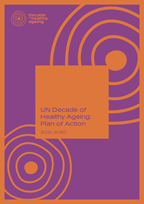
Introduction
With the adoption of the United Nations (UN) Decade of Healthy Ageing (2021–2030) by the 73rd World Health Assembly on 3 August 2020 and by the 75th General Assembly on 14 December 2020, countries have committed to 10 years of concerted and collaborative action to improve the lives of the older people (defined as age 60 years and over), their families and the communities in which they reside.
To enable countries to monitor and evaluate the Decade's progress and impact, a monitoring and evaluation framework and standard set of indicators and measures are needed. These indicators should monitor healthy ageing, social determinants of health, health conditions, behaviour risks and well-being of older people. Guidance on measures, data collection, analysis and reporting are urgently needed to support global, regional and national monitoring of the actions, programmes and policies.
To provide advice on the monitoring and evaluation framework, prioritizing and standardizing indicators and how to improve ageing and health measurement globally, WHO, in collaboration with UN DESA, UNFPA, ITU, ILO, UN Women, established the Technical Advisory Group (TAG) for Measurement, Monitoring and Evaluation of the United Nation's Decade of Healthy Ageing (2021-2030).
Functions of the TAG
In its capacity as an advisory body to the WHO, the Technical Advisory Group (TAG) shall provide technical advice in the following areas:
1. development of existing and new indicators for monitoring and evaluating the progress and impact of the UN Decade of Healthy Ageing at all levels (global, regional, national and local), aligning with and leveraging on other ageing-related data efforts such as MIPAA (Madrid International Plan of Action on Ageing) and the voluntary review of SDGs;
2. proposed methods for producing global, regional and national, and subnational estimates linked to the UN Decade of Healthy Ageing;
3. measurement and operationalization of new and existing indicators (e.g. intrinsic capacity, functional ability and environments) linked to the Decade actions areas and related programmes or initiatives (such as integrated care for older people, long-term care for older people, combatting ageism, age-friendly environments and communities, among others);
4. standardization of measures, mode of data collection, data harmonization for comparability, data analysis across all indicators for the UN Decade of Healthy Ageing and guidance for decision-making and capacity building in these areas at the country level.
TAG Members and TORs
Contact us
For more information, please contact the TAG SecretariatUpcoming Meetings
Previous meetings
All →Latest publications
Resources and publications

Decade of Healthy Ageing: Plan of Action
External publications
The UN Decade of healthy ageing: strengthening measurement for monitoring health and wellbeing of older people
Attributes and definitions of locomotor capacity in older people: a World Health Organisation (WHO) locomotor capacity working group meeting report
A call for standardised age-disaggregated health data
Measuring functional ability in healthy ageing: a nationwide cross-sectional survey in the Philippine older population
Related work

